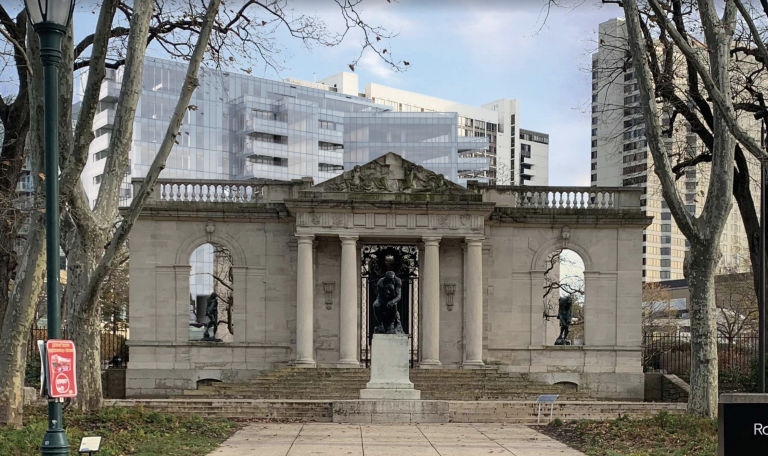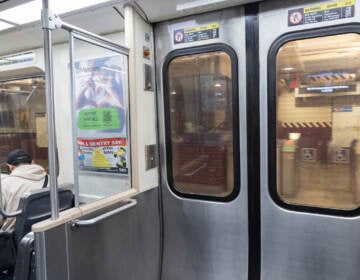Parkway condo opposed by Rodin Museum, Rail Park wins key city approval
A condo building that opponents say could disrupt plans to extend the Rail Park and endanger Rodin Museum holdings has won the final city approval needed to break ground.

A rendering of 2100 Hamilton St. behind the Rodin Museum. (Cecil Baker + Partners)
This article originally appeared on PlanPhilly.
—
A condo building that opponents say could disrupt plans to extend the Rail Park and endanger Rodin Museum holdings has won the final city approval needed to break ground.
The Philadelphia Art Commission voted unanimously on Wednesday to allow developer Ernest Bock and Sons to move forward with their 2100 Hamilton Avenue project. The 10-story building will overlook the 89-year-old Rodin Museum and occupy one of the last slices of developable land on the iconic Benjamin Franklin Parkway. The approval was given under the condition that Bock and Sons meet with the concerned leaders of the Rodin Museum.
The art institution did not send a representative to the meeting. Officials instead submitted a critical letter requesting a delay of the luxury housing project so that more study of its impact could be done.
A previous light study done by the developer at the request of the commission found that the reflective glass exterior of the building would have minimal effect on its priceless holdings and neoclassical facade. Rodin Museum officials dispute those findings.
“The museum was not engaged in this process and only reviewed the findings on Monday, which notably did not come from the Bock developer group,” the letter reads. “The study acknowledges it is not carried out with a knowledge of the internal layout of the museum or the makeup of the museum’s windows.”
The museum isn’t the only critic of the proposed Bock building. Battersea Ventures owns the Dalian On The Park apartment building behind the site where the condo tower would rise. They have appealed the zoning permit for the structure and also testified against the project at the Art Commission, warning that it is too tall, too broad, and its effects on the Rodin Museum still too uncertain.
City officials have reviewed multiple prior proposals for a residential building on the vacant land behind the Rodin Museum, but the Art Commission has never before given the approvals for a project to work out.
This Progressive-era municipal body enjoys veto power over the appearance of municipal buildings, public art, and projects along the Parkway.
There is an old rail line that runs behind 2100 Hamilton. Friends of the Rail Park, the nonprofit that oversees the Callowhill elevated viaduct-turned-park, have long dreamt of turning that neglected trench into another public green. But the group does not have the funds to build and did not send a representative to Wednesday’s meeting. Bock also imagines turning the overgrown rail connection into a park, but the developer’s plans call for capping and gating it for a private garden to be shared by the project’s 33 condos.
The 2100 Hamilton project architect, Cecil Baker, assured the Art Commission that the least reflective glass possible was chosen for the project. He said the conversations had gone on long enough.
“We live in a city, reflections are all over the place,” said Baker. “The museum frankly never wanted us there. Never. Now I feel like there is an undue and harsh burden being placed on this building.”
Art Commission chair Alan Greenberger asked the commissioners to consider the interests in play before they voted. The Rodin Museum opposed the project from the start, he noted, and fears about reflections were only the most recent of their concerns. He said Battersea Ventures “has a vested interest in views” of their tenants in the Dalian building.
The commission gave the project conceptual approval in 2015, although the design has undergone a substantial revision in the years since. That was four years ago, and it was high time for a final vote, Greenberger suggested.
The Art Commission approval means that the only outstanding hurdle is the appeal of the zoning permit by Battersea Ventures. The city rarely recalls zoning permits for by-right projects like 2100 Hamilton.
WHYY is your source for fact-based, in-depth journalism and information. As a nonprofit organization, we rely on financial support from readers like you. Please give today.







